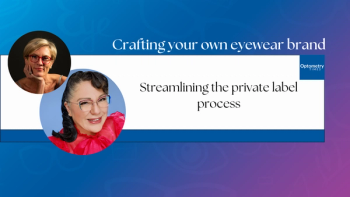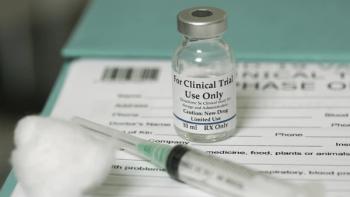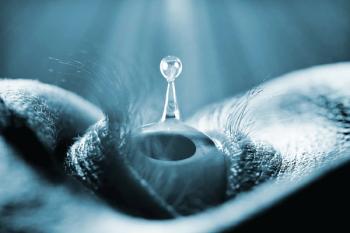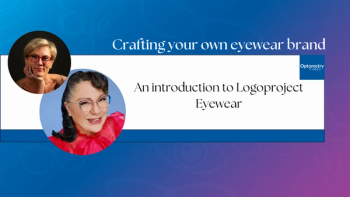
A game changer for your practice
Dailies Total 1 water-gradient, daily disposable contact lenses are made using a new silicone hydrogel material (delefilcon A). The lens surface has a water content of more than 80%, and mimics the natural hydrophilic ocular surface. Studies have found that Dailies Total 1 lenses remained subjectively moist and comfortable throughout the day.
Wow!
That was my first impression when I tried on the new Dailies Total 1 water-gradient 1-day contact lenses (CLs) by Alcon. I gave up CLs years ago because I could never get over the feeling of persistent presence. This is the first CL I’ve ever worn that I didn’t even know was in my eye.
Dailies Total 1 represents a new era in CLs. The lens, more than a decade in development, was designed to address some of the key challenges in daily CL practice relating to CL comfort, fit, handling, visual acuity, and ocular health. It is the first and only water-gradient CL, allowing a gradual transition from 33% water at the silicone-hydrogel core to more than 80% water content at the CL surface (see Figure 1). The water content approaches 100% at the very outer surface, similar to the precorneal tear film.1
The highly lubricous outer surface is composed of an ultrasoft surface gel which makes up about 10% of the lens thickness and is composed of a non-silicone hydrophilic polymer network with extended surface polymer chains. The water gradient occurs between the core and the surface where the water content rapidly increases as the material shifts from a silicone-rich core material to an essentially silicone-free hydrophilic surface gel.2 The lens surface mimics the natural hydrophilic ocular surface. Water gradient technology provides excellent tear film stability, according to John Pruitt, PhD, project Head, biocompatibility projects for Alcon Vision Care research and development.
New product, new materials, new manufacturing
Dailies Total 1 lenses are manufactured using LightStream technology with a new silicone hydrogel material called delefilcon A. Dailies Total 1 lenses have a very low surface modulus, which enhances comfort, and a moderate modulus silicone hydrogel core that facilitates ease of handling. With a Dk/t of 156 (at -3.00 D), Dailies Total 1 lenses have the highest oxygen transmissibility of any daily disposable lens and a surface water content of more than 80%.3
Dr. Bowling is in solo private practice in Gadsden, AL, and is chief optometric editor of Optometry Times. What truly sets this lens apart is its initial and end-of-day comfort. Most CL wearers silently struggle with CL dryness and discomfort. Based on a survey of 113 CL patients, 86% reported their eyes dried out when wearing CLs, yet less than a quarter of them mentioned it to their eyecare provider (ECP) during the most recent exam.
Of the patients surveyed, 80% said their CLs were uncomfortable at the end of the day, and 76% complained of irritated eyes when wearing CLs-once again only about 10% of these patients actually reported symptoms to their ECP.4
In an ongoing survey in Europe of 24 ECPs fitting 280 patients with Dailies Total 1 CLs, there was a 79% overall reduction in end-of-day dryness, a 60% overall increase in wearers who could wear lenses comfortably all day long, a 45% overall increase in clear vision until the end of the day, and an 89% overall increase in end-of-day comfort with Dailies Total 1 CLs vs. competitors’ lenses.5 The study subjects showed a 13:1 preference for Dailies Total 1 CLs over their previous CLs.5
In 5 clinical studies of 236 patients, 97% of subjects were successfully fit with Dailies Total 1 lenses in clinical trials.6 In another clinical study of 80 patients, 9 out of 10 subjects agreed that Dailies Total 1 CLs were so comfortable they didn’t feel anything in their eyes.7
“Dailies Total 1 CLs are easy to fit, with minimal physiological change to the ocular surface,” added Lyndon Jones, PhD, FAAO, director of the Center for Contact Lens Research at the University of Waterloo in Waterloo, ON, Canada. “Studies at our center found that these lenses remained subjectively moist and comfortable throughout the day.”
Wowing the marketplace
Remember the “wow” I said I personally experienced with these CLs? Evidently I wasn’t alone. Among CL wearers in the European survey, 68% reported feeling a wow experience when first applying the Dailies Total 1 CLs.5 “The Dailies Total 1 CLs provide excellent comfort, excellent vision and an excellent patient experience,” said Joe Rappon, OD, head of clinical trial management for Alcon.
The CL market is shifting away from 2-week replacement lenses, with monthly replacement and daily disposable showing gains in market share. Dailies Total 1 CLs represent a breakthrough innovation that will enable us to better address our patient’s visual and comfort requirements.
Every day, patients embrace new technologies in their daily lives, including smart phones and tablet computers. As ECPs, we want to provide our patients with the best technologies to ensure they continue to come see us. The new Dailies Total 1 water-gradient CLs are just that-breakthrough technology. All of our patients deserve to try these lenses and experience the wow for themselves.ODT
References
- Angelini TE, Nixon RM, Dunn AC, et al. Viscoelasticity and mesh-size at the surface of hydrogels characterized with microrheology. Poster presented at the Association for Research in Vision and Ophthalmology, May 5 - 9, 2013, Seattle, WA.
- Thekveli S, et al. Structure-property relationship of delefilcon A lenses. Poster presented at the 2012 British Contact Lens Association Annual Clinical Conference and Exhibition, May 24-27, 2012, Birmingham, UK.
- Straehla J, Limpoco F, Dologova N, et al. Nanomechanical probes of single corneal epithelial cells: Shear stress and elastic modulus. Tribology Letters 2010;38(2):107-113.
- Based on a survey of 113 contact lens patients; Alcon data on file, 2006.
- Based on an ongoing survey in Europe of 24 ECPs fitting 280 customers in Dailies Total 1 contact lenses; Alcon data on file.
- In 5 clinical studies with 236 patients; Alcon data on file, 2011.
- In a clinical study of 80 patients; Alcon data on file, 2011.Based on third party industry report, 2008-2012. Alcon data on file.
Figure 1. Contact lens cross-section with water content values. (Illustration courtesy of Alcon.)
Newsletter
Want more insights like this? Subscribe to Optometry Times and get clinical pearls and practice tips delivered straight to your inbox.













































.png)


